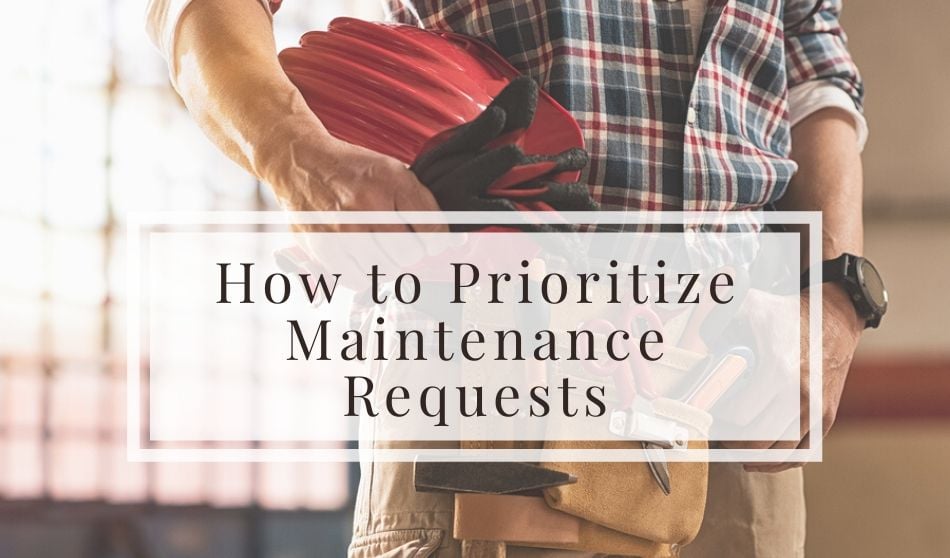
Aside from ensuring that your rental is occupied with a tenant that pays rent on time, maintenance is one of your most important tasks as a landlord or property manager. Regular maintenance keeps your tenants safe, your property protected from investment-killing damage, and keeps your tenants happy. Chances are, you already know how vital regular maintenance responding to maintenance requests is crucial to serve your tenants well.
The burden can come when it feels like every maintenance request demands to be “top priority.” How do you prioritize your maintenance work orders when every request feels high priority? While each request should be assessed and responded to within a timely manner, some tasks are truly emergent. Here’s what you need to keep in mind when assessing your maintenance tasks.
Evaluate and Prioritize Your Maintenance Requests:
All maintenance requests will fall under one of these four categories: urgent, high-priority, medium-priority, and low priority. Here is how you can evaluate and distinguish between them.
Identifying Urgent or Emergency Maintenance Tasks:
It will be generally easy to spot a maintenance emergency. These are issues that immediately and effectively compromise the safety, general habitability, and long-term investment of the property. Issues like power loss, a burst pipe, a fire or HVAC failure. A burst pipe suddenly flooding a kitchen is an issue of habitability for your tenants and will cost thousands of dollars in damage if not immediately rectified.
Since these tasks are so urgent and a quick response is key to ensure your tenants’ safety and the integrity of your property, it is a good idea to have a preferred vendor list at the ready for any such occasion. This list can be given out to your tenants in case of midnight emergencies and will allow them to immediately get help for a pressing issue. Alternatively, you can keep this list on-hand for yourself or your management team to promptly request the right vendor yourself.
Navigating High-Priority to Medium-Priority Maintenance Requests:
While emergency maintenance tasks are easy to spot, assessing the priority of high to medium maintenance tasks can get tricky. If you are struggling with identifying which tasks to address first, mentally assess each repair request on a scale of 1-5. This will help you strip away the periphery factors and give an unbiased evaluation to the importance of the task.
High priority tasks are maintenance issues that will directly affect operations in the near future. These might include leaking roofs or pipes, a bedbug infestation, or most broken in-unit appliances. Once again, these are items that must be addressed promptly to ensure that your tenant and property are safe. If ignored these issues could pose a high financial risk or will negatively impact your tenants’ ability to live safely in the unit.
Medium-priority maintenance tasks primarily consist of preventative maintenance. These tasks are crucial to ensuring that your properties stay in top shape, and play a key role in long-term operations. These responsibilities are time-sensitive but not urgent. Medium-priority tasks will affect operations eventually and need to be performed to maintain optimum production. Examples can include seasonal maintenance tasks such as debris and bush removal for fire prevention, slip prevention in the fall and winter, and other issues that could pose a risk in the near future.
Assessing Low Priority Tasks:
Similarly to emergency maintenance requests, you will likely know a low priority task when you see it. These requests neither pose a safety risk, risk damaging the property over time, nor do they prevent tenants from utilizing the rental as needed. Low and lowest priority maintenance requests are often cosmetic and cause more of a nuisance than pose a threat, but this can make them all-too-easy to disregard entirely. Tasks like replacing the oven’s light bulb, cosmetic wall repairs, etc. can be easily assigned a 1-2 rating on your scale. Just ensure that you do eventually get to them to avoid complaints from your tenants.
Prevent Emergent Requests Through Regularly Scheduled Maintenance:
Completing maintenance as promptly as possible reduces downtime and long-term costs. It also prevents you from being liable due to an unaddressed unsafe situation. Moreover, prompt maintenance makes your tenants feel heard and happy! This will ensure a good tenant wants to stay long-term at your property.
Keeping on-task when it comes to addressing your maintenance responsibilities ensures that you are efficiently handling your time. Keeping track of those pesky seasonal tasks can prevent an emergency call in the middle of the night down the road.
Use Your Software to Track and Assign Requests
If you have property management software, like Rentec Direct, maintenance task prioritization is a breeze. You can receive notifications with tenant maintenance requests, reply to the tenant, and assign each task a priority all in one place. For property managers with large teams, you can even assign tasks to specific managers and vendors. This makes keeping track of all of your to-do’s more efficient, allowing you to spend more time actually addressing the needs at hand.
Want to Know More About How to Do This Within Your Rentec Direct Account?
To find out more about tracking maintenance within your Rentec Direct software, and to dive in with some additional features, don’t miss our upcoming webinar on June 17th 2020 at 11:00 am PST.
Register here for the free Features for Managing Your Properties webinar.
Hosted by our director of client experience, Janell Kittleson, this webinar will go over how to properly set up properties in your account, features for managing your properties and day-to-day operations, and tools for marketing your properties and filling vacancies fast. You won’t want to miss out on Janell’s tips for efficiently managing your rental properties online. Great for those new to the software, and those who have been actively using Rentec Direct for years. There will be treasures of advice for all!
Related Reading For You:
- Important Inspections for Your Rental Property
- The Property Manager’s Guide to Long-Term Maintenance
- Property Maintenance During COVID-19